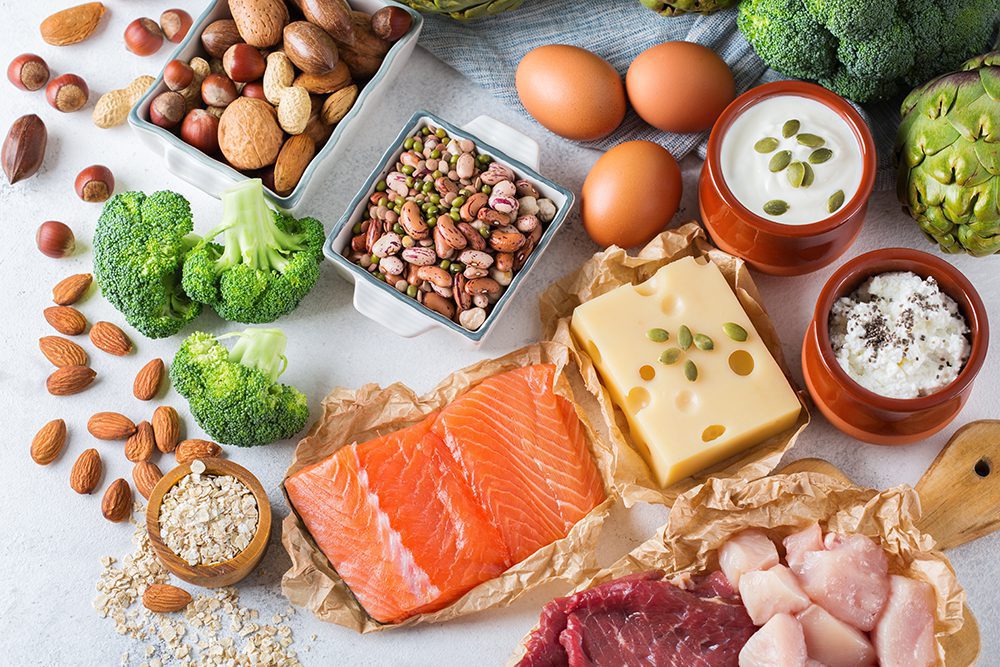The world seems slightly obsessed with the myriad of different protein-packed diets on the market, but when it comes to women the medical consensus is that protein in menopause packs power.
A balanced whole-food diet high in fruits, vegetables, whole grains, dairy and protein is important, no matter what your stage of life, but numerous health studies suggest that diets that are higher in protein have serious benefits. And while most people consume enough, when it comes to menopause and aging, it might be time to consider upping your intake.
What is protein?
Protein is an essential macronutrient, that is one of the bosies most important building blocks of life and is found in every cell of the body. The basic structure of protein is a chain of 20 kinds of amino acids and is found in every cell of the human body. Protein is required to build, and repairs cells and plays a part in producing hormones, protects the body from harmful germs and viruses, and ensures the healthy growth of babies in utero, children and teens. And if you’re not getting enough, you run the risk of loss of muscle mass, stunted growth, impaired organ function, and weakened muscles and bones.
Engaging in regular resistance exercise activity and managing your dietary intake of good quality protein during the menopausal transition becomes critical to supporting the immune system, keeping bones strong and strengthening muscles.
Protein and Menopause
As we age and go through menopause, muscle mass and bone strength reduce due to decreasing estrogen levels, which increases the risk of a slowing metabolic rate, sarcopenia (the involuntary loss of skeletal muscle with age) and osteoporosis, increasing the risk of falls and fractures, weakening of the heart and respiratory system, and even death. Proteins also have a role to play in our immune health and weight management, as they help us feel fuller longer and help curb sugar cravings.
Engaging in regular resistance exercise activity and managing your dietary intake of good quality protein during the menopausal transition becomes critical to supporting the immune system, keeping bones strong, strengthening muscles and is critical to maintaining health and vitality. Research demonstrates that simple lifestyle changes for women over 50, such as including high quality protein at each meal and increasing physical activity, can help. Resistance training is also recommended as it can help reduce waist circumference and increase muscle strength which can also substantially reduce the risk of developing type 2 diabetes.
How much protein do I need?
The optimal daily protein intake is 0.8 grams per kilogram of body weight per day. So, if a woman weighs 60kg her recommended intake of protein would be 48 grams.
The best sources of protein
Unfortunately, not all sources of protein are equal so, as we age, it is imperative to source and consume healthy, high-quality protein. Some of the best sources are…
Meat and poultry – Chicken breast has extremely high levels of protein and being lean is good for heart health, turkey is also lean, high in protein and packed with vitamins and minerals. Lean beef is another great choice with high levels of protein, as well as iron and vitamin B12.
Fish & Seafood – Fish is a good choice of protein, with tuna and salmon are particular standouts as they are rich in protein, low in fat and boast essential nutrients including omega-3 fatty acids. Clams, prawns, mussels, scallops, lobster, oysters and crab are other healthy, protein-packed choices.
Dairy – Milk is a good source of protein that is also high in calcium, phosphorus, and riboflavin, as is Greek yoghurt and cheese. The cheeses highest in protein include cottage, parmesan, mozzarella and cheddar.
Eggs – a low-carb and low-calorie source of protein, eggs contain all nine essential amino and are a natural source of omega-3 fatty acids, vitamins A, D, E, and B12 plus a variety of antioxidants.
Plant-based sources of healthy protein include…
Soy products – including tofu, edamame and tempeh are rich sources of plant-based protein and are high in B vitamins, fibre, potassium and magnesium.
Grains – including oats, quinoa, wild rice and teff are protein packed super food that are rich in essential vitamins, minerals, fibre and antioxidants.
Legumes – including Lentils, soybeans, kidney beans and chickpeas are high in fibre, iron, folate, copper, manganese, magnesium, and potassium and amongst the very best sources of plant-based protein.
Nuts – including Almonds, pistachios and peanuts – which are also rich in fibre, vitamin E, manganese, and magnesium.
Seeds – Pumpkin seeds, flax, sunflower and chia seeds all pack a hefty punch of protein and are very high in iron, magnesium and zinc. Chia seeds are also high in manganese, phosphorus, copper and calcium.
Green vegetables – Including broccoli, Brussels sprouts, green peas, avocado are protein packed choices, and packed with essential nutrients.
Disclaimer: This article provides general information only, and does not constitute health or medical advice. If you have any concerns regarding your health, seek immediate medical attention.








